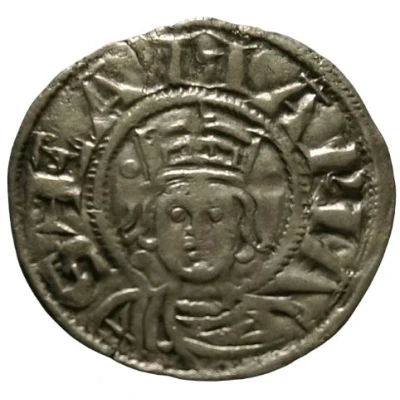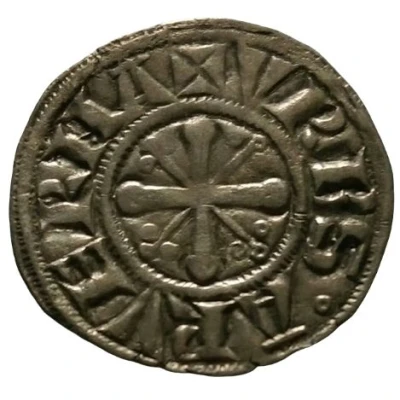


© Quiquengrogne
Denier anonymous Bust ND
| Billon | 1 g | 19 mm |
| Issuer | Bishopric of Clermont (French States) |
|---|---|
| Type | Standard circulation coin |
| Years | 1200-1300 |
| Value | 1 Denier (1⁄240) |
| Currency | Livre |
| Composition | Billon |
| Weight | 1 g |
| Diameter | 19 mm |
| Shape | Round (irregular) |
| Technique | Hammered |
| Orientation | Variable alignment ↺ |
| Demonetized | Yes |
| Updated | 2024-10-04 |
| Numista | N#50877 |
|---|---|
| Rarity index | 80% |
Reverse
Cross with clovers in quarters linked to the center.
Script: Latin
Lettering: ✠ VRBS ° ARVERNA
Unabridged legend: Urbs Arverna
Translation: City of Clermont.
Comment
Coinage of the Virgin may have begun under the episcopates of Aimerie (1111-1150) or Étienne VI de Mercoeur (1151-1169). The heavy weight of some examples suggests the first possibility. Hugues de la Tour (1250-1286) was reprimanded by Alphonse de Poitiers (1241-1271), brother of Saint-Louis, for weakening coinage. In 1295, Philippe IV confirmed Adhémar de Cros's right to mint coins. Clermont coinage is still mentioned in 1315 under the episcopacy of Aubert de Montaigu (1307-1328).This type of coinage underwent several evolutions and lasted until around 1315. In the ordinance of 1315, the denier was cut to 1/234 marc de Paris (1.045g) with a denomination of 3 deniers 16 grains (0.292) and a value of 13/12 deniers tournois (0.92).
On the right, the "E" in "SEA" is in fact a square C, the vertical bar of which is crossed out horizontally to form a cross and thus abbreviate the word. This type of abbreviation is also found, among others, on the denarii of the Abbey of Saint-Martial in Limoges, which also feature a frontal bust.
Variant: PA#2251
Obverse: same bust and legend, but the head is not framed by rings.
Reverse: same legend, but a ringlet is attached to each side of the end of each branch of the cross, for a total of eight ringlets (somewhat in the style of the barbarins from Saint-Martial de Limoges).
This rarer type of denarius may have preceded the first.
Interesting fact
One interesting fact about this coin is that it was minted during a time of great turmoil in France, specifically during the Wars of Religion between Catholics and Protestants. Despite the conflict, the coinage of the Bishopric of Clermont continued to be produced, albeit with some variations in design and materials. This coin, made of Billon and weighing 1g, is a testament to the resilience and resourcefulness of the people of Clermont during a period of great upheaval.
Price
| Date | Mintage | VG | F | VF | XF | AU | UNC |
|---|---|---|---|---|---|---|---|
| ND (1200-1300) | - | - | - | - | - | - |
Values in the table are based on evaluations by sales realized on Internet platforms. They serve as an indication only for Denier anonymous (Bust) ND (1200-1300) coin.